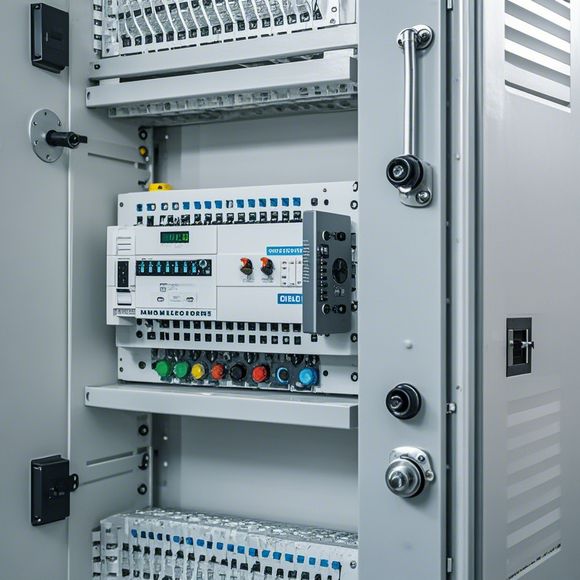PLC Controllers - The Backbone of Modern Manufacturing
PLC Controllers are the backbone of modern manufacturing. They are responsible for controlling and monitoring various industrial processes, ensuring that they run smoothly and efficiently. With their advanced features and reliability, PLC controllers have become an essential tool in the world of manufacturing. Whether it's a simple assembly line or a complex factory floor, PLC controllers are crucial in ensuring that everything runs as planned. So next time you hear someone talking about manufacturing, don't be surprised to hear about the power of PLC controllers.
Introduction:
In today's world, manufacturing has become more efficient and cost-effective with the help of modern technology. One such technology is the Programmable Logic Controller (PLC), which plays a crucial role in controlling various industrial processes. These controllers are designed to handle complex tasks by providing precise and reliable control over machinery, equipment, and systems. In this article, we will explore the importance of PLC controllers in modern manufacturing and their impact on the industry.
The Importance of PLC Controllers in Modern Manufacturing:
1、Automation of Industrial Processes: PLC controllers have revolutionized the way industries operate. They automate the production process by controlling the flow of materials, machines, and tools. This automation reduces errors, improves efficiency, and enhances productivity. For example, in a food processing plant, PLC controllers can be used to monitor and control the temperature, humidity, and other parameters that affect the quality of the final product.

2、Flexibility and Customization: PLC controllers are highly flexible and customizable, allowing manufacturers to tailor their systems to meet specific requirements. They can be programmed to perform different tasks based on customer orders or changes in demand. For instance, a car manufacturer may need to adjust the assembly line based on the model of the vehicle being produced.
3、Robustness and Durability: PLC controllers are built to withstand harsh environments and operate for long periods without failure. They are resistant to electromagnetic interference, vibration, and other environmental factors that can damage electronic components. This makes them ideal for applications where reliability is critical, such as in power generation, transportation, and industrial automation.
4、Cost-Effectiveness: Compared to traditional manual controls, PLC controllers are more cost-effective. They require fewer people to operate and can be programmed to run automatically, saving time and reducing labor costs. Additionally, they can be easily integrated into existing systems, reducing the need for expensive hardware upgrades.
5、Energy Efficiency: PLC controllers can help reduce energy consumption in industrial processes. By optimizing the use of resources, they can minimize wasted energy and generate more revenue from the same amount of raw materials. For example, in a manufacturing facility, PLC controllers can be programmed to shut down machines when not in use, reducing energy waste.
6、Security and Compliance: PLC controllers come with advanced security features that protect against cyber threats and ensure compliance with regulatory requirements. They can be configured to monitor and control access to sensitive data, prevent unauthorized access, and detect and respond to potential security breaches. This ensures that industrial processes remain safe and secure while complying with legal regulations.

7、Integration with Other Technologies: PLC controllers can be integrated with other technologies such as sensors, actuators, and communication networks to create smarter and more efficient systems. For example, in a smart factory, PLC controllers can be connected to sensors that measure temperature, pressure, and other physical parameters. This information can be used to optimize the manufacturing process and improve product quality.
8、Scalability: PLC controllers can be easily scaled up or down depending on the needs of an organization. They can be added or removed from a system as needed, making them ideal for businesses that experience fluctuations in demand for products or services. Additionally, they can be reprogrammed to accommodate changes in production schedules or new technologies.
9、Maintenance and Support: PLC controllers are easy to maintain and support. They come with comprehensive documentation and training materials that guide users in troubleshooting and repairing the devices. Additionally, many manufacturers offer extended warranties and maintenance plans to ensure that their customers receive ongoing support and updates.
10、Environmental Concerns: As concerns about sustainability grow, PLC controllers play a vital role in reducing waste and minimizing environmental impact. By optimizing resource usage and minimizing energy consumption, they help companies reduce their carbon footprint and contribute to a greener future.
Conclusion:

In conclusion, PLC controllers are essential components of modern manufacturing that have transformed the way industries operate. Their ability to automate processes, provide flexibility and customization, ensure robustness and durability, and save cost make them a valuable investment for any business looking to increase efficiency and profitability. As technology continues to advance, we can expect PLC controllers to play an even greater role in shaping the future of manufacturing and beyond.
Content expansion reading:
Articles related to the knowledge points of this article:
PLC Programming for Automation Control in the Manufacturing Industry
PLC (Programmable Logic Controller) Control System Basics
Plumbers Rule! The Role of PLC Controllers in the World of Waterworks
The Role of Programmable Logic Controllers (PLCs) in Foreign Trade Operations
Connecting a PLC Controller to Your Computer
PLC Controllers: A Comprehensive Guide to Understanding Their Prices